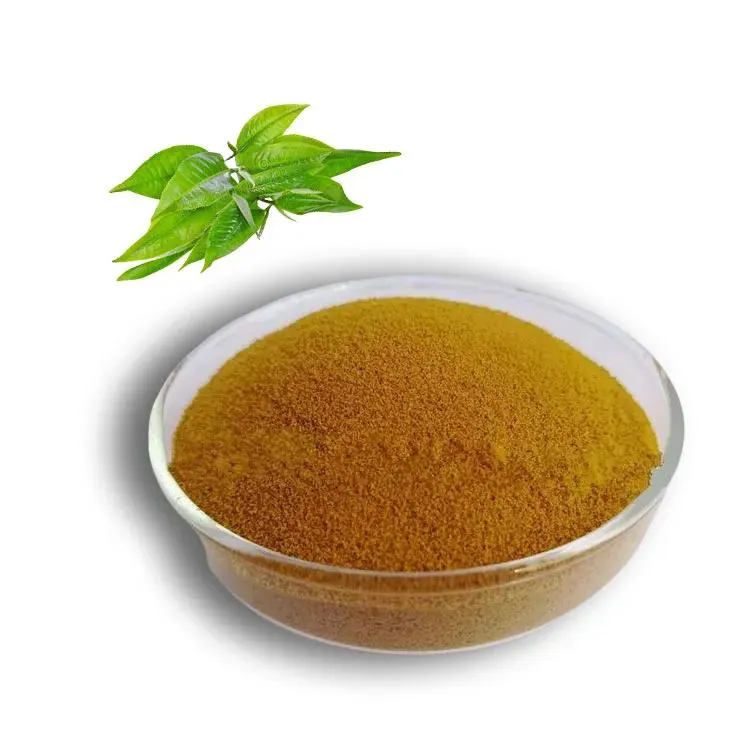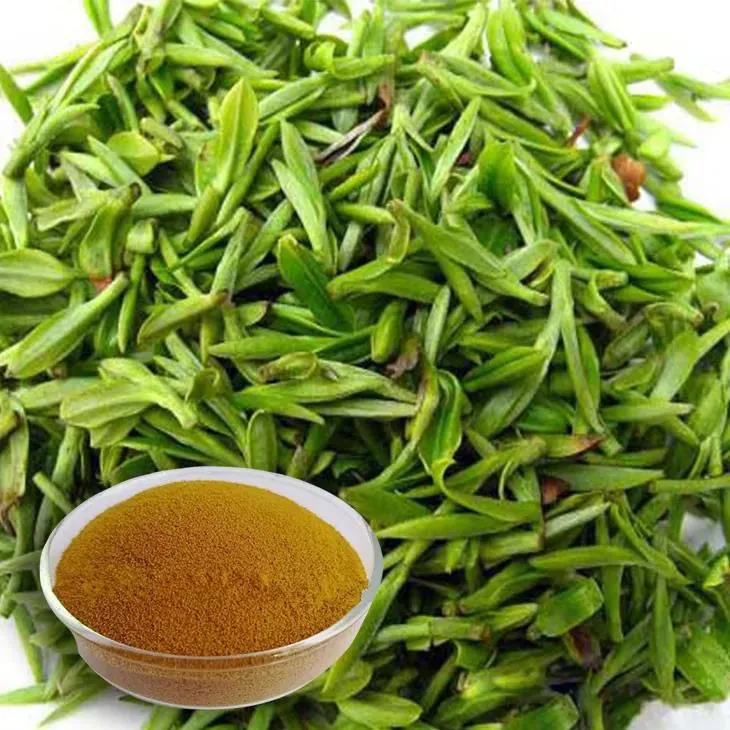- 0086-571-85302990
- sales@greenskybio.com
Fueling Your Body with Nature's Best: Grape Seed and Green Tea Extracts Compared
2024-08-17

1. Introduction
In the pursuit of a healthy lifestyle, natural supplements have gained significant popularity. Among these, Grape Seed Extract and Green Tea Extract stand out for their potential health - enhancing properties. Both are rich in bioactive compounds that can have a positive impact on the body. This article aims to compare these two natural extracts in terms of their nutritional profiles, antioxidant capabilities, and potential health benefits, enabling readers to make more informed choices about incorporating them into their daily regimens.

2. Nutritional Profiles
2.1 Grape Seed Extract
Grape seeds are a rich source of several nutrients. They contain polyphenols, which are a group of chemical substances with antioxidant properties. One of the main polyphenols in Grape Seed Extract is proanthocyanidin. This compound is known for its ability to protect cells from damage. Additionally, grape seed extract contains small amounts of vitamins such as vitamin E, which is also an antioxidant. It also has some minerals like potassium and magnesium, although in relatively small quantities compared to other dietary sources.
2.2 Green Tea Extract
Green Tea Extract is derived from the leaves of the Camellia sinensis plant. It is rich in catechins, which are a type of polyphenol. The most abundant and well - known catechin in green tea is epigallocatechin - 3 - gallate (EGCG). Green tea extract also contains caffeine, which can provide a mild energy boost. In addition to catechins and caffeine, it has other components like amino acids, particularly L - theanine. L - theanine has been associated with relaxation and stress reduction, working in harmony with the stimulating effects of caffeine in green tea.

3. Antioxidant Properties
3.1 Grape Seed Extract's Antioxidant Mechanism
The proanthocyanidins in grape seed extract act as powerful antioxidants. They are able to scavenge free radicals in the body. Free radicals are unstable molecules that can cause damage to cells, proteins, and DNA. By neutralizing these free radicals, grape seed extract helps to prevent oxidative stress. Oxidative stress has been linked to a variety of health problems, including heart disease, cancer, and neurodegenerative disorders. The antioxidant activity of grape seed extract is not only due to its ability to directly neutralize free radicals but also its potential to regenerate other antioxidants in the body, such as vitamin C and E.
3.2 Green Tea Extract's Antioxidant Mechanism
The catechins in green tea extract, especially EGCG, are highly effective antioxidants. EGCG can inhibit the formation of free radicals and also has the ability to chelate metal ions. Metal ions can catalyze the production of free radicals, so by chelating them, EGCG helps to reduce oxidative stress. Moreover, the combination of catechins and other components in green tea extract, such as caffeine and L - theanine, may enhance its overall antioxidant effect. The antioxidant properties of green tea extract have been studied extensively in relation to various health conditions, and it has been shown to have potential in preventing chronic diseases.

4. Potential Health Benefits
4.1 Heart Health
- Grape Seed Extract: There is evidence to suggest that grape seed extract may contribute to heart health. Its antioxidant properties can help prevent the oxidation of low - density lipoprotein (LDL) cholesterol, which is a key step in the development of atherosclerosis. By reducing oxidative stress in the blood vessels, it may also help to improve endothelial function. Endothelial cells line the blood vessels and play a crucial role in regulating blood flow and blood pressure.
- Green Tea Extract: Green tea extract has also been associated with heart health benefits. The catechins in it can help lower blood pressure and improve lipid profiles. For example, some studies have shown that regular consumption of green tea or its extract can lead to a reduction in total cholesterol and triglyceride levels. Additionally, the caffeine and L - theanine combination may have a positive impact on heart rate variability, which is an indicator of heart health.
4.2 Cancer Prevention
- Grape Seed Extract: In vitro and some in vivo studies have indicated that grape seed extract may have anti - cancer properties. The proanthocyanidins can interfere with the growth and spread of cancer cells. They may act by inhibiting cell cycle progression, inducing apoptosis (programmed cell death) in cancer cells, and blocking angiogenesis (the formation of new blood vessels that supply tumors). However, more research is needed to fully understand its potential in cancer prevention and treatment.
- Green Tea Extract: Green tea extract has been extensively studied for its potential anti - cancer effects. The EGCG in particular has shown promise in inhibiting the growth of various types of cancer cells. It can target multiple signaling pathways involved in cancer cell survival, proliferation, and metastasis. For instance, it has been studied in relation to breast, prostate, and colorectal cancers, and has shown potential in reducing the risk of these cancers, although conclusive evidence from large - scale clinical trials is still lacking.
4.3 Skin Health
- Grape Seed Extract: Grape seed extract can be beneficial for skin health. Its antioxidant properties help to protect the skin from damage caused by ultraviolet (UV) radiation and environmental pollutants. It may also improve skin elasticity and hydration. Some topical products containing grape seed extract are used for anti - aging purposes as it can stimulate collagen production in the skin.
- Green Tea Extract: Green tea extract is also used in skin care products. The catechins in it have anti - inflammatory properties that can help soothe irritated skin. It can also protect the skin from UV - induced damage. The antioxidant activity of green tea extract helps to maintain the integrity of skin cells and may contribute to a more youthful appearance.
4.4 Brain Health
- Grape Seed Extract: There is some evidence to suggest that grape seed extract may have positive effects on brain health. The antioxidant and anti - inflammatory properties may help protect neurons from damage. It may also improve cognitive function in some cases, although more research is needed to establish its definite role in preventing neurodegenerative diseases such as Alzheimer's and Parkinson's.
- Green Tea Extract: Green tea extract has been studied for its potential in brain health. The combination of caffeine and L - theanine can improve alertness and concentration. Additionally, the catechins in green tea may have neuroprotective effects, protecting the brain from oxidative stress and inflammation. Some studies have suggested that regular consumption of green tea may be associated with a reduced risk of developing neurodegenerative diseases.
5. Dosage and Safety Considerations
5.1 Grape Seed Extract
The appropriate dosage of grape seed extract can vary depending on the intended use. For general health benefits, a typical dosage may range from 100 - 300 mg per day. However, it is important to note that high doses may cause side effects such as nausea, headache, and dizziness. People with bleeding disorders or those taking blood - thinning medications should be cautious when using grape seed extract, as it may increase the risk of bleeding due to its potential anti - platelet effects.
5.2 Green Tea Extract
When it comes to green tea extract, the dosage also depends on various factors. For general supplementation, a dosage of 200 - 300 mg per day of green tea catechins is often recommended. Green tea extract contains caffeine, so excessive consumption may lead to side effects such as insomnia, jitters, and increased heart rate. Pregnant and breastfeeding women should limit their intake of green tea extract due to the caffeine content and potential effects on the fetus or infant.
6. Conclusion
Both grape seed extract and green tea extract offer a range of potential health benefits due to their rich nutritional profiles and antioxidant properties. They have shown promise in areas such as heart health, cancer prevention, skin health, and brain health. However, it is important to consider the appropriate dosage and potential safety issues when using these extracts. Whether one chooses grape seed extract, green tea extract, or both, they can be valuable additions to a healthy lifestyle. Further research is still needed to fully understand the mechanisms of action and long - term effects of these natural extracts, but current evidence provides a solid foundation for their use in promoting overall health.
FAQ:
What are the main components in grape seed extract?
Grape seed extract contains various components. It is rich in proanthocyanidins, which are a type of flavonoid. These proanthocyanidins are powerful antioxidants. It also contains phenolic acids, flavonols, and other phytochemicals that contribute to its potential health - promoting properties.
What are the antioxidant properties of green tea extract?
Green tea extract is well - known for its antioxidant properties. It contains catechins, such as epigallocatechin - 3 - gallate (EGCG). These catechins can scavenge free radicals in the body, reducing oxidative stress. They help protect cells from damage and play a role in various health aspects like reducing the risk of chronic diseases.
How can grape seed extract benefit heart health?
Grape seed extract may benefit heart health in several ways. Its antioxidant properties help prevent the oxidation of LDL cholesterol, which is a risk factor for heart disease. It may also improve blood vessel function by enhancing endothelial function. Additionally, it can have anti - inflammatory effects that are beneficial for the cardiovascular system.
Can green tea extract aid in weight loss?
Green tea extract may potentially aid in weight loss. The catechins in it, especially EGCG, can increase thermogenesis, which is the body's process of burning calories to produce heat. It may also help in reducing appetite and improving fat metabolism, although the effects may be relatively modest and should be combined with a healthy diet and regular exercise for significant weight loss.
Are there any side effects of consuming grape seed or green tea extracts?
For grape seed extract, in some cases, it may cause mild side effects such as upset stomach, headache, or dizziness, especially when consumed in large amounts. Green tea extract may also cause similar side effects, and in addition, due to its caffeine content, it can cause insomnia, nervousness, or increased heart rate in some individuals. However, these side effects are not common when consumed in moderation.
Related literature
- The Antioxidant Properties of Grape Seed Extract"
- "Green Tea Extract: Health Benefits and Applications"
- "Comparative Analysis of Grape Seed and Green Tea Extracts in Promoting Health"
- ▶ Hesperidin
- ▶ Citrus Bioflavonoids
- ▶ Plant Extract
- ▶ lycopene
- ▶ Diosmin
- ▶ Grape seed extract
- ▶ Sea buckthorn Juice Powder
- ▶ Fruit Juice Powder
- ▶ Hops Extract
- ▶ Artichoke Extract
- ▶ Mushroom extract
- ▶ Astaxanthin
- ▶ Green Tea Extract
- ▶ Curcumin
- ▶ Horse Chestnut Extract
- ▶ Other Product
- ▶ Boswellia Serrata Extract
- ▶ Resveratrol
- ▶ Marigold Extract
- ▶ Grape Leaf Extract
- ▶ New Product
- ▶ Aminolevulinic acid
- ▶ Cranberry Extract
- ▶ Red Yeast Rice
- ▶ Red Wine Extract
-
American Ginseng Root Extract
2024-08-17
-
Hericium erinaceus extract powder
2024-08-17
-
Grapefruit Seed Extract Powder
2024-08-17
-
Buckthorn bark extract
2024-08-17
-
Natural grape seed extract
2024-08-17
-
Sea buckthorn Juice Powder
2024-08-17
-
Avocado Extract Powder
2024-08-17
-
Coconut Water Powder
2024-08-17
-
Shikone Extract
2024-08-17
-
Clove Powder
2024-08-17





















